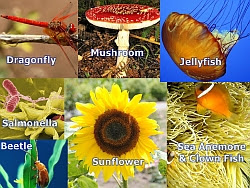Living organisms are divided into five kingdoms:
- Monera - the most simple living things.
- Protista - eukaryotes with only one cell.
- Fungi - mushrooms, mould and yeast.
- Plantae - all plants, such as trees and grass.
- Animalia - all animals, including people.
Sometimes, you will see a 6-kingdom classification, where monera is sub-divided into archaebacteria and eubacteria. For the purpose of this post, we will maintain the 5-kingdom classification.
How are living organisms classified?
They are classified according to:
How are living organisms classified?
They are classified according to:
- cell type
- number of cells and
- type of nutrition
Monera (or prokaryotes) are the simplest living beings. They have only one cell, but which hasn't got a nucleus. Cells with a nucleus are called eukaryotes. Some monera are autotrophic meaning they are capable of manufacturing complex organic nutritive compounds from simple inorganic sources such as carbon dioxide, water, and nitrates, using light or chemical energy; and some are heterotrophic meaning they cannot synthesize their own food and are dependent on complex organic substances for nutrition.
Monera include all kinds of bacteria.
Protista are also very small. Most have only one cell, but some have a few. Unlike monera, they are eukaryotes. They can be autotrophic or heterotrophic.
Examples of protista are single-celled algae and amoebae (singular: amoeba).
Most fungi (singular: fungus) are multicellular, although yeast is unicellular. Their cells have nuclei (singular: nucleus), which means they are eukaryotes. Unlike plants, fungi do not have tissues, and they cannot make their own food, i.e. they are heterotrophic.
Mushrooms, mould and yeast are fungi.
The plantae kingdom is the second largest kingdom, with over 250,000 species. They are autotrophic eukaryotes, which means they have complex cells, and can make their own food.
Plants range from tiny mosses to enormous trees. There are flowering plants called angiosperms and non-flowering plants called gymnosperms. Without plants, there will probably be no life here on Earth! Almost all heterotrophs feed on plants.
The largest kingdom is animalia, consisting of over 1 million species. All animals are heterotrophic eukaryotes with many complex cells. The higher animals are vertebrates, such as birds and mammals; and the lower animals are invertebrates. The simplest (least highly evolved) include the protozoa (singular: protozoan), sponges, jellyfish, and worms. Other invertebrates include arthropods, molluscs, and echinoderms.
Try this quiz to test/reinforce your knowledge. If you provide a valid email, you will receive your results (with the correct answers) automatically.
Monera include all kinds of bacteria.
Protista are also very small. Most have only one cell, but some have a few. Unlike monera, they are eukaryotes. They can be autotrophic or heterotrophic.
Examples of protista are single-celled algae and amoebae (singular: amoeba).
Most fungi (singular: fungus) are multicellular, although yeast is unicellular. Their cells have nuclei (singular: nucleus), which means they are eukaryotes. Unlike plants, fungi do not have tissues, and they cannot make their own food, i.e. they are heterotrophic.
Mushrooms, mould and yeast are fungi.
The plantae kingdom is the second largest kingdom, with over 250,000 species. They are autotrophic eukaryotes, which means they have complex cells, and can make their own food.
Plants range from tiny mosses to enormous trees. There are flowering plants called angiosperms and non-flowering plants called gymnosperms. Without plants, there will probably be no life here on Earth! Almost all heterotrophs feed on plants.
The largest kingdom is animalia, consisting of over 1 million species. All animals are heterotrophic eukaryotes with many complex cells. The higher animals are vertebrates, such as birds and mammals; and the lower animals are invertebrates. The simplest (least highly evolved) include the protozoa (singular: protozoan), sponges, jellyfish, and worms. Other invertebrates include arthropods, molluscs, and echinoderms.
Try this quiz to test/reinforce your knowledge. If you provide a valid email, you will receive your results (with the correct answers) automatically.
Click here to begin the quiz
Images sourced from Wiki Commons
Teachers, please take note: some of my quizzes, like this one, for example, ask for an email. If an email is provided, the results will be sent automatically to it. This allows you to grade/check your students' progress. If you haven't got an email for this purpose, I'd suggest creating one for this purpose, and ask the students to provide that email in the quiz.
JIGSAW PUZZLES
Click here for the 49-piece jigsaw puzzle.
If you think you're good, try this 150-piece!
Please provide feedback in the comments section below. It's what keep this blog going. :-)



This is an easy to understand explanation.
ReplyDelete<span>
In honor of Teacher Appreciation Week, boojeebeads.com is having a contest where every teacher in your school can win a free gift! Check out the contest at <span>
http://www.facebook.com/pages/BooJee-Beads/199463822387?v=box_3&ref=mf
</span>
</span>
Thanks Tracy. I've kept it very basic since it really is just a summary to prepare potential quiz takers. They have their books in case they need more detailed explanation. ;)
ReplyDeleteChiew, i.m passed ok? barca el mejor!!~~
ReplyDelete<span><span><span><span><span><span>Heyaaa Chiew :D </span><span>I'm very tired of doing this exercise! </span><span>but in the end I passed and got the highest punctuation: D
ReplyDelete</span><span>" style="BACKGROUND-COLOR: #fff" closure_uid_ezjmen="66">I like your blog :) </span></span>
</span></span></span></span>
<span><span><span><span>Heyaaa Chiw :) </span><span>I am very tired of doing this exercise! </span></span><span><span>but in the end I passed and got the highest punctuation ^^</span></span></span></span>
ReplyDelete<span><span><span><span></span></span></span></span>
<span>
<span><span>
<span>I like your blog!</span>
</span></span>
</span>
Well done, Jae! :)
ReplyDeleteYes, I noticed, Cris. Well done! :)
ReplyDeleteI hope that, even though you were <span>tired</span> of doing them, it's helped you to remember the important things! :-P
<span><span>I already arranged my computer.
ReplyDelete</span><span>I did the natural.</span></span>
i passed :-P
Chiew, i.m passed ok? barca el mejor!!~~
ReplyDelete<span><span><span><span>Heyaaa Chiw :) </span><span>I am very tired of doing this exercise! </span></span><span><span>but in the end I passed and got the highest punctuation ^^</span></span></span></span>
ReplyDelete<span><span><span><span></span></span></span></span>
<span>
<span><span>
<span>I like your blog!</span>
</span></span>
</span>